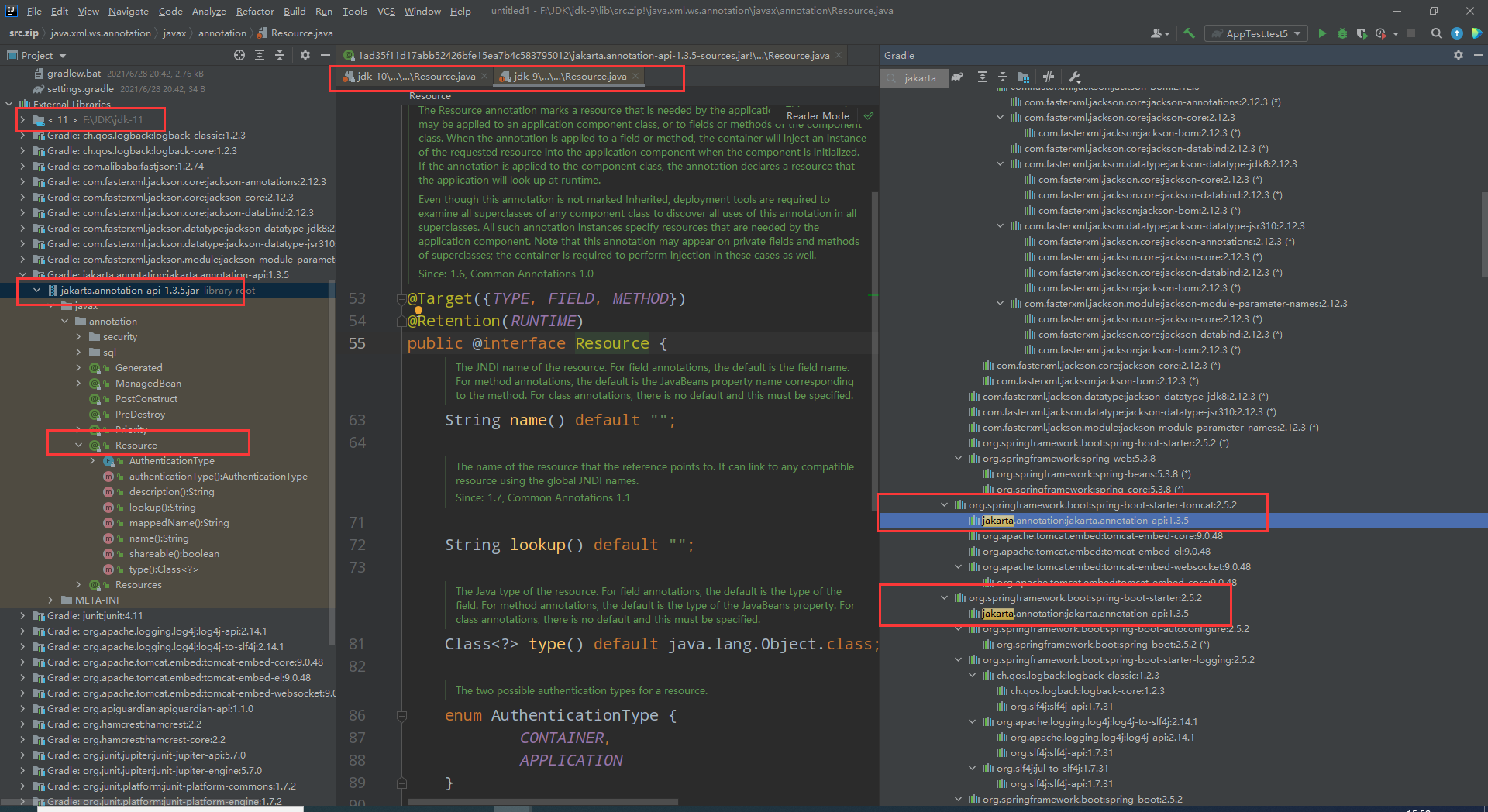@Service("userService")
spring产生一个service层bean示例,就是相当于把
UserServiceImpl userService = new UserServiceImpl();
这一步给自动化管理了。你要用的话直接引入就可以了
@Service("userService")
public class UserServiceImpl implements UserService {
@Resource
private UserMapper userMapper;
@Override
public User getUserById(String id) {
return userMapper.getUserById(id);
}
}
@Value注解使用自定义参数
springboot application.yml 配置
server:
port: 80
servlet:
context-path:
#自定义参数配置
custom:
value1: 测试参数1
map: "{ds: '发送失败',ds3: '未发送,ds4: 发送成功'}"
list: "test,test32"
自定义参数配置类
// 标明这是一个配置类
@Configuration
// lombok 实体注解
@Data
public class CustomVariableConfig {
//从 application 配置文件中获取 custom.value1 的值 “测试参数1” 注入到 customValue1。
@Value("${custom.value1:defaultValue}")//设置默认值defaultValue,如果value1没有值则使用defaultValue
private String customValue1;
//${}只能获取到字符串,二次加工需要搭配#{}使用
@Value("#{${custom.map}}")
private Map<String,String> map;
@Value("#{'${custom.list}'.split(',')}")
private List<String> list;
}
@ConfigurationProperties配置参数空间注解
java类
@Component
// lombok 实体注解
@Data
//自定义参数空间,会自动扫描 custom 下的所有配置参数(默认支持驼峰转换)并尝试注入到该实体类的同名属性中。
@ConfigurationProperties("custom")
public class CustomVariableConfig {
/*
@Value("#{${custom.map}}")
private Map<String,String> map;
类使用ConfigurationProperties注解时失效,项目启动出错,但是该语法放入controller类下可以直接使用。
*/
/**
* 由于 已使用ConfigurationProperties注解,该 Value 注解可以忽略。
* 而且,在ConfigurationProperties配置类下,Value注解的支持非常不友好,只支持基础类型注入,
* 不建议混用。
*/
@Value("${custom.customValue1}")
private String customValue1;
/**
* 参数名默认驼峰转换 simple-view-controllers——>simpleViewControllers
*/
private List<Map<String,String>> simpleViewControllers;
}
yml文件配置
#自定义参数配置
custom:
customValue1: 测试参数1
# value注解 map案例,外面的双引号可用可不用
map: "{ds: '发送失败',ds3: '未发送,ds4: 发送成功'}"
# value注解 list使用案例,外面的双引号可用可不用
list1: "test,test32"
# ConfigurationProperties注解 搭配使用案例
#配置简单请求路径,需要搭建自己的处理器,该配置方式必须有使用 ConfigurationProperties注解 的参数配置类引入,好像不可以使用 value注解 解析
simple-view-controllers:
- urlParame: index
templatePath: index
- urlParame: forgetPsd
templatePath: user/ordinary
- urlParame: iregister
templatePath: user/admin
- urlParame: boss
templatePath: user/boss
@Autowired与@Resource的区别
@Autowired
1、本身无name属性,如果想通过名称匹配注入则需要配合@Qualifier注解一起使用。
@Autowired()
@Qualifier("userService")
UserService userService;
2、默认required为true,即叫这个名字的bean实例必须要有,不然报错。可手动设置为false,此时代码会有警告。妈蛋上传不了图片。就是下面的Qualifier注解属性会变成大红色。
@Autowired(required = false)
@Qualifier("userService")
UserService userService;
3、由spring提供
@Resource
1、name属性值设置则通过name匹配,
@Resource(name = "userService")
UserService userService;
//上面这段代码必须有对应的userService,如果下面的这个实现类没有指定service名字为userService则会报错
@Service("userService")
public class UserServiceImpl implements UserService {}
2、name属性值未设置则先按照名字后通过类型匹配
@Resource()
UserService userService;
//下面这里无论是否指定service名字都不会报错
@Service("userService")
public class UserServiceImpl implements UserService {}
3、由jdk1.6开始提供
4、默认可为空
2021.8.8补充
从jdk11开始,移除了@Resource注解,该注解Spring家族通过引入 jakarta.annotation:jakarta.annotation-api:1.3.5 来支持该注解。

@ComponentScan
设置 spring 扫描包路径
//单个扫描
@ComponentScan(basePackages = {"com.jdw.springboot.entity"})
//多个扫描
@ComponentScan(basePackages = {"com.jdw.springboot.*","com.jdw.springboot2.*"})
用于告诉spring去哪里获取bean。spring不会再扫描所有注解的bean,而只会扫描指定的包下面的。而且这个太深了也不行。
//正常
@ComponentScan(basePackages = {"com.jdw.springboot.*"})
//出错
@ComponentScan(basePackages = {"com.*"})
注意
‘.*’ 不能扫到下面所有,最好还是写清楚。
//奇葩异常一:Property 'sqlSessionFactory' or 'sqlSessionTemplate' are required
@ComponentScan(basePackages = {"com.*"})
@MapperScan("com.jdw.springboot.mapper")
//正常
@ComponentScan(basePackages = {"com.jdw.*"})
@MapperScan("com.jdw.springboot.mapper")
@Component
直接写在类上面,标明这个类要被 spring 管理(相当于举手,并不一定被管理。)
@Component
public class TimedTask {
//标明这个方法是个定时任务
@Scheduled(fixedRate = 2000)
private void task1() throws Exception{
System.out.println("2秒执行一遍定时任务");
}
}
@Aspect 面向切面编程相关
直接写在类上面,标明这个类是个切面类,即:
AOP (Aspect Oriented Programming)中的 Aspect
//标明这是一个切面类
@Aspect
//标明这个类由 spring 自动管理
@Component
public class ControllerAspect {
@Pointcut(value = " execution(public * com.jdw.sys.controller..*.*(..))")
public void webLog() {
}
/**
* 退出执行,final增强,不管是抛出异常或者正常退出都会执行
*/
@After("webLog()")
public void doAfter() {
log.info("After");
}
}
@Pointcut
// 扫描controller下的所有类
// @Pointcut(value = "within(com.jdw.sys.controller.*)")
// 扫描使用了 GetMapping 注解的所有类
// @Pointcut(value = "@annotation(org.springframework.web.bind.annotation.GetMapping)")
// 扫描 com.jdw.sys.controller 下的类及其下面子包内的类 的 访问修饰符为 public 方法(public可以不设置,则扫描所有)
// 修饰方法,声明一个切面对象,切面名字是方法名 "webLog()" 具体切面是 value 值设置
@Pointcut(value = " execution(public * com.jdw.sys.controller..*.*(..))")
public void webLog() {
}
2020.08.01补充:
spring 切面的思想是面向类切面,所以内部方法之间的调用时不会触发切面的。
失败案例:
@RestController
@RequestMapping("/demo")
public class DemoController {
@GetMapping("/test")
public String test(){
return test1();
}
public String test1(){
return "fdsdfs";
}
}
@Aspect
//标明这个类由 spring 自动管理
@Component
//引用 lombok 的 log
@Slf4j
public class ControllerAspect {
//设置切面
// 扫描类
// @Pointcut(value = "within(com.jdw.sys.controller.*)")
// 扫描注解
// @Pointcut(value = "@annotation(org.springframework.web.bind.annotation.GetMapping)")
// 扫描 com.jdw.sys.controller 下的类及其下面子包内的类 的 访问修饰符为 public 方法(public可以不设置,则扫描所有)
@Pointcut(value = " execution(public * com.jdw.sys.controller..*.test1(..))")
public void webLog() {
}
@Before
//方法执行前执行
@Before("webLog()")
public void doBefor(JoinPoint joinPoint) {
//接受请求,记录请求内容
ServletRequestAttributes attributes = (ServletRequestAttributes) RequestContextHolder.getRequestAttributes();
HttpServletRequest request = attributes.getRequest();
//打印请求内容
log.info("URL:" + request.getRequestURI());
log.info("HTTP_METHOD:" + request.getMethod());
// log.info("IP:"+request.getRemoteAddr());
// log.info("HOST:"+request.getRemoteHost());
// log.info("PORT:"+request.getRemotePort());
Enumeration<String> parameterNames = request.getParameterNames();
log.info("请求参数列表为:");
while (parameterNames.hasMoreElements()) {
String s = parameterNames.nextElement();
log.info(s + ":" + request.getParameter(s));
}
}
@After
/**
* 退出执行,final增强,不管是抛出异常或者正常退出都会执行
*/
@After("webLog()")
public void doAfter() {
log.info("After");
}
@AfterReturning
/**
* 方法正常退出时执行,在 @After 后面执行
*/
@AfterReturning(returning = "object", pointcut = "webLog()")
public void doAfterReturning(Object object) {
log.info("RESPONSE:" + object);
}
@AfterThrowing
/**
* 抛出异常执行,在 @After 后面执行
*/
@AfterThrowing(value = "webLog()", throwing = "exception")
public void doAfterThrowing(JoinPoint joinPoint, Exception exception) {
log.info(joinPoint.getSignature().getName() + "抛出异常:" + exception.getMessage());
}
@Around
2020.08。01补充:
ProceedingJoinPoint(程序连接点)类的几个实用方法,
Object[] getArgs:返回目标方法的参数
Signature getSignature:返回目标方法的签名
Object getTarget:返回被织入增强处理的目标对象
Object getThis:返回AOP框架为目标对象生成的代理对象
/**
* 环绕通知:
* 环绕通知非常强大,可以决定目标方法是否执行,什么时候执行,执行时是否需要替换方法参数,执行完毕是否需要替换返回值。
* 环绕通知第一个参数必须是org.aspectj.lang.ProceedingJoinPoint类型
* 如过环绕通知决定不执行目标方法,则其他切面注解定义的处理都不会执行.
*/
@Around("webLog()")
public Object aroundAdvice(ProceedingJoinPoint proceedingJoinPoint) {
log.info("- - - - - 环绕通知 - - - -");
log.info("环绕通知的目标方法名:" + proceedingJoinPoint.getSignature().getName());
try {//obj之前可以写目标方法执行前的逻辑
// log.info("执行目标方法前执行");
Object obj = proceedingJoinPoint.proceed();//调用执行目标方法
return obj;//返回目标方法返回值
} catch (Throwable throwable) {
throwable.printStackTrace();
} finally {
log.info("- - - - - 环绕通知 end - - - -");
}
return null;
}
@EnableScheduling+@Scheduled 集成定时任务
springboot的定时任务超简单,两个注解搞定。
@EnableScheduling
启动类添加 @EnableScheduling 注解,开启定时任务。
@SpringBootApplication
//springboot 设置 component 扫描路径
@ComponentScan(basePackages = {"com.jdw.*.*"})
//springboot 设置 mapper 扫描路径
@MapperScan("com.jdw.*.mapper")
//springboot 开启定时任务
@EnableScheduling
public class SpringbootApplication {
public static void main(String[] args) {
SpringApplication.run(SpringbootApplication.class, args);
}
}
bean类 方法上添加 @Scheduled 注解,标明这个方法是一个定时任务。
//交给 spring 管理
@Component
public class TimedTask {
private static int t = 0;
// 标明这个方法是个定时任务,每两秒创建一个等待上一个完成后执行。
// 上一个执行完毕,新的立即执行。
// 上一个未执行完毕,新的不会执行,如果上一个的执行时间超过了两秒,则上一个执行完毕后,新的立即执行。
// @Scheduled(fixedRate = 2000L)
// 标明这个方法是个定时任务,上一个定时任务完成后2秒新建定时任务开始执行。
// @Scheduled(fixedDelay = 2000L)
// 标明这个方法是个定时任务,每四秒钟判断上一个是否已执行,上一个执行完毕则新建定时任务开始执行。未执行完毕则等待4秒后继续判断
@Scheduled(cron = "0/4 * * * * ?")
private void task1() throws Exception{
t++;
System.out.println("task"+t+":定时任务开始"+(new Date()).getTime());
Thread.sleep(2000);
// System.out.println("task1:定时任务休眠完成"+(new Date()).getTime());
}
}
@Lazy懒加载注解
@Controller
@RequestMapping("/gcjs/bszn")
public class GcjsBsznController {
@Autowired
//当被调用时 spring 执行构造器构造对象。如果没有该注解,则是当该类实例被创建时执行构造器构造对象。
@Lazy
private ICCfgTypeService cCfgTypeService;
}
@RequestBody 请求体注解
//使用@RequestBody注解,自动将请求体转对象时需注意。
//接收对象类型,要么使用fast.Json接收,要么使用自定义vo对象或bean对象接收。
//经测试,当我们需要将请求体转为bean对象时,sf.json、hutool.json、jackson对于枚举属性的转换很不友好。
@PostMapping("test")
@RequestBody
public object test(@RequestBody Object object){
return object;
}
@JsonFormat对象转json时变量转换规则
//该案例代表,当将该对象以json返回给前端时,时间会转换为"yyyy-MM-dd HH:mm:ss"格式的字符串
@JsonFormat(timezone = "GMT+8", pattern= "yyyy-MM-dd HH:mm:ss")
private LocalDateTime updateTime;
@DateTimeFormat json字符串转对象时变量转换规则
//该案例代表,当直接以对象接收入参时,会将updateTime字符串值以"yyyy-MM-dd HH:mm:ss"格式转换为LocalDateTime类型
@DateTimeFormat(pattern = "yyyy-MM-dd HH:mm:ss")
private LocalDateTime updateTime;
@SpringBootTest
@ActiveProfiles("native")
/**
* @Author ListJiang
* @Since 1.0.1
* datetime 2021/7/1 13:30
*/
// 声明这是一个springboot项目测试
@SpringBootTest
// 指定测试运行环境
@ActiveProfiles("native")
public class DemoWebTest {
@Test
void contextLoads() {
String t = "[ tt ts]";
String substring = t.substring(1, t.length() - 1);
System.out.println(substring);
}
}
@ConditionalOnProperty
// 声明一个配置类,当存在spring.profile.active配置的属性值包含dev的时候生效
@Configuration
@ConditionalOnProperty(prefix = "spring.profile", name = "active", havingValue = "dev")
public class RestTemplateConfig {
}